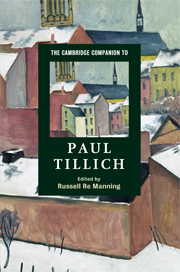Book contents
- Frontmatter
- Part I Standing within the theological circle
- 1 Tillich’s life and works
- 2 Tillich as systematic theologian
- 3 Tillich on God
- 4 Tillich’s Christology
- 5 Tillich’s theology of the concrete spirit
- 6 Faith (and religion)
- 7 ‘First, read my sermons’ Tillich as preacher
- Part II Theology of culture
- Part III Tillich in dialogue
- Bibliography
- Index
3 - Tillich on God
from Part I - Standing within the theological circle
Published online by Cambridge University Press: 28 May 2009
- Frontmatter
- Part I Standing within the theological circle
- 1 Tillich’s life and works
- 2 Tillich as systematic theologian
- 3 Tillich on God
- 4 Tillich’s Christology
- 5 Tillich’s theology of the concrete spirit
- 6 Faith (and religion)
- 7 ‘First, read my sermons’ Tillich as preacher
- Part II Theology of culture
- Part III Tillich in dialogue
- Bibliography
- Index
Summary
The intellectual appeal and the hermeneutical challenge of interpreting Paul Tillich's doctrine of God lies in his typical habit of inventing creative formulations and phrases. Tillich seeks to combine diverse traditions - speculative philosophy and Lutheran theology, proclamation of the gospel and dialogue with other religions or religious 'seekers', fundamental insights of liberal and dialectical theology, modern existentialism and classical Greek ontology, German Idealism and religious socialism - and equally diverse motives. Tillich often attempts to combine pastoral and systematic, apologetic and cultural, elementary pedagogical and complex phenomenological, and academic and ecclesial concerns in order to arrive at a new language. Moreover, one always has to keep in mind his sensitivity for a specific audience, whether German or North American, academic or non-academic, religious or agnostic. Finally, we need to take into account developments and shifts in his thinking, although these should not be over-exaggerated. This complex unity or multidimensionality, if you will, helps to explain three characteristic aspects of the reception of Tillich's work, which are also important for his doctrine of God: a far-reaching interpretative potential; one-sided interpretations and appropriations; and one-sided critiques.
- Type
- Chapter
- Information
- The Cambridge Companion to Paul Tillich , pp. 37 - 55Publisher: Cambridge University PressPrint publication year: 2009
- 3
- Cited by



